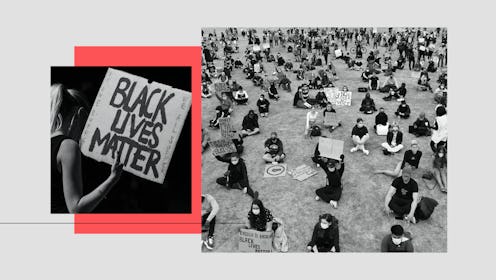News
Black Lives Matter Protests In The UK: Where, When & How To Join Safely

With protests set to continue in the U.S. over the weekend, the UK is also preparing to stand in solidarity, supporting the Black Lives Matter movement with demonstrations across the country. From London to Edinburgh, Manchester to Southampton, thousands are preparing to march this weekend.
Protesting isn't the only way you can show your support, of course, but if you are marching, there are a few things to keep in mind and know. How to reduce cybersecurity risks, for example, but also what to wear to a protest to stay safe. Read on for more information on what to do if you are stopped by police in the UK and the public health measures you need to remain vigilant of.
What do UK lockdown measures say about protesting?
As BBC News reports, there are no rules that are explicitly against protesting during the pandemic. However, the government guidelines do state that while you can spend unlimited time outdoors, you can only meet up “in groups of up to six people from different households, following social distancing guidelines.” This is obviously harder to do in a protest, but many organisers have been firm about adhering to guidelines and social distancing measures.
Could I be fined for taking part in a protest?
There is a possibility you could be fined "on coronavirus health grounds," as per BBC News. In a statement regarding George Floyd's death, the National Police Chief's Council shared their support, but also warned about not gathering in groups of more than six people: "We stand alongside all those across the globe who are appalled and horrified by the way George Floyd lost his life," the statement reads.
"We know people want to make their voices heard. The right to lawful protest is a key part of any democracy, which UK police uphold and facilitate. But coronavirus remains a deadly disease and there are still restrictions in in place to prevent its spread, which include not gathering outside in groups of more than six people. So for whatever reason people want to come together, we ask that people continue to work with officers at this challenging time."
What should I do if I'm stopped by police?
Black Lives Matter UK have put together helpful resources outlining exactly what to do if you are stopped by the police, as well as up-to-date bustcards outlining key advice and local legal aid contacts, should you need them.
Among their key advice is to say "no comment" to all police questions; to not accept a caution without advice from a solicitor; and to insist on your right to free legal advice at the police station.
What public health measures should I need to be mindful of before and during a protest?
The collective anger, grief and wider calls for police reform cannot and should not be undermined, but the potential health implications of mass gatherings during a pandemic cannot be ignored. Therefore, a number of organisations have spoken out about the personal precautions all protesters must take. They include:
- Assess your own health. Do you have symptoms of coronavirus? Have you come into contact with anyone that has recently contracted the virus? If so, you should not physically joining the protest.
- Take the vulnerable people in your life into account. Earlier this week, government reports confirmed that people from ethnic minorities are at a higher risk of dying from coronavirus, and if you have contact with people in your life who are more susceptible to the virus, then it's highly advisable that you consider their safety and wellbeing.
- Be prepared to self-isolate for two weeks following a protest in order to prevent potential spread within your household and local community, as per LDN BLM.
- Socially distance where possible while protesting. If you do attend the protest with friends and family, try to keep it to a small group and be transparent about symptoms and previous potential exposure.
- Wear PPE at all times, including masks and gloves. Also carry spares and hand sanitiser, to keep yourself and those around you protected. Also keep in mind all these best practice measure when wearing – and removing – your face mask..
- Yelling can spread the virus, so "choose signs, drums, or similar noise makers" advises Ellie Murray, epidemiology assistant professor at Boston University School of Public Health.
Below is a list of protests taking place around the UK this weekend, which will be updated as more details become available.
Wednesday, June 10
Thursday, June 11
Newport – Civic Centre, 1 p.m.
Friday, June 12
Kettering – Meadow Road/Westfield Park, 12:30 p.m.
Saturday, June 13
Croydon – Croydon Central, 12 p.m.
Chelmsford – Central Park Chelmsford, 1 p.m.
Surbiton – Alexandra Recreation Park, 1 p.m.
Cleethorpes – Cleethorpes Leisure Centre, 3 p.m.
Friday, June 19
Birmingham – Victoria Square, 4 p.m.
Past Protests
Friday, June 5
Bristol — College Green, 1 p.m.
Basingstoke — Eastrop Park, 12 p.m.
Saturday, June 6
London — Parliament Square, 1 p.m.
Weston-super-Mare — Weston Seafront, 2 p.m.
Cambridge — Parker’s Piece, 2 p.m.
Swindon — Regent Circus, 1 p.m.
Manchester — Piccadilly Gardens, 1 p.m.
Leicester — Clock Tower, 1 p.m.
Belfast – Custom House Square, 3 p.m.
Sheffield – Devonshire Green, 1 p.m.
And for those in Ireland, on Saturday June 6
Sunday, June 7
Chester — Chester Cathedral, 1 p.m.
Nottingham — Forest Recreation Ground, 12 p.m.
Edinburgh — Princes Street Gardens, 1 p.m.
Glasgow — George Square, 2 p.m.